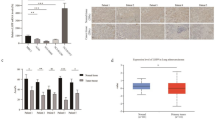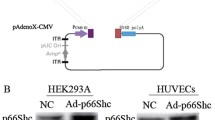Abstract
Objective: To study the growth suppression of lung adenocarcinoma cell by the introduction of wild-type P53 gene and explore a gene therapy approach for lung adenocarcinoma. Methods: A replication-deficient adenovirus vector encoding a wild-type P53 was constructed and transfected into the cultured human lung adenocarcinoma cell line GLC-82. The efficiency of gene transfection and expression was detected by immunochemical staining and polymerase chain reaction. The cell growth rate and cell cycle were analysed by cell-counting and flow cytometry. Results: Wild-type P53 gene could be quickly and effectively transfected into the cells by adenovirus vector. Wild-type P53 expression could inhibit GLC-82 cell proliferation and induce apoptosis. Conclusion: The results indicated that recombinant adenovirus expressing wild-type P53 might be useful vector for gene therapy of human lung adenocarcinoma.
Similar content being viewed by others
References
Mujoo K, Maneval DC, Anderson SC, et al. Adenoviral-mediated P53 tumor suppressor gene therapy of human ovarian carcinoma. Oncogene 1996; 12:1617.
Malkin D, Li FP, Strong LC. Gemline P53 mutationsina familial syndrome of breast cancer sarcomas, and other neoplasms. Science 1990; 250:1233.
Eastham JA, Hall SJ, Sehgal I, et al.In vivo gene therapy with P53 or P21 adenovirus for prostate cancer. Cancer Res 1995; 55:5151.
Wang JX, Bucana CD, Roth JA, et al. Apoptosis induced in human osteosarcoma cells is one of the mechanisms for the cytocidal effect of Ad5CMV-P53. Cancer Gene Therapy 1995; 2:9.
Zheng YX, Deiry WS. Regulation of P21 expression by P53-independent pathways. Oncogene 1996; 12:1557.
Santoso JT, Tang DC, Lane SB, et al. Adenovirus-based P53 gene therapy in ovarian cancer. Gynecol Oncol 1995; 59:171.
Bennett MR, Evan GI, Schwartz SM. Apoptosis of rat vascular smooth muscle cells in regulated by P53-dependent and independent pathways. Circ Res 1995; 77:266.
Will KN, Maneval DC, Menzel P, et al. Development and characterization of recombinant adenoviruses encoding human P53 for gene therapy of cancer. Human Gene Therapy 1994; 5:1079.
Yang C, Cirielli C, Capogrossi MC, et al. Adenovirus-mediated wild-type P53 expression induces apoptosis and suppresses tumorigenesis of prostatic tumor cells. Cancer Res 1995; 55:4210.
Author information
Authors and Affiliations
Additional information
This study was supported in part by grant from National Nature Science Foundation of China (No. 39570775).
Rights and permissions
About this article
Cite this article
Li, J., **a, Y., Jiang, L. et al. Adenovirus-mediated wild-type P53 expression suppresses growth of lung adeno-carcinoma cells. Chinese Journal of Cancer Research 10, 178–181 (1998). https://doi.org/10.1007/BF02948356
Accepted:
Issue Date:
DOI: https://doi.org/10.1007/BF02948356




